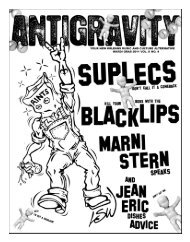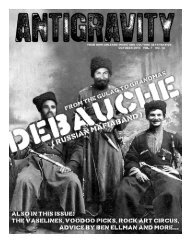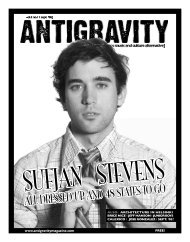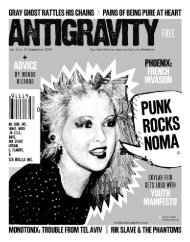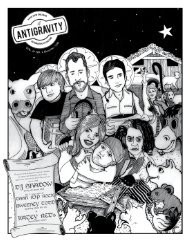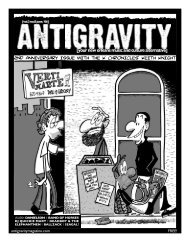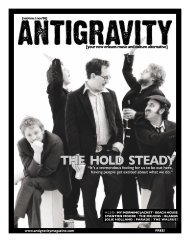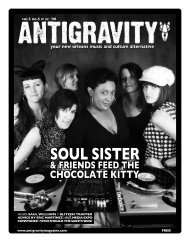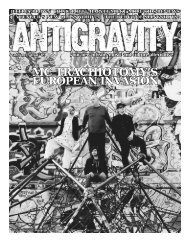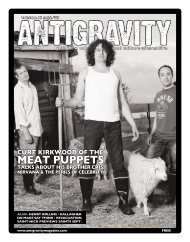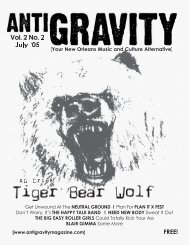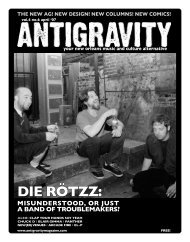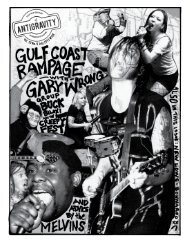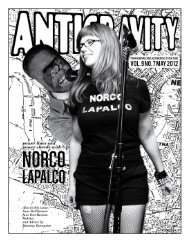REVOLUTIONSTHE OFFICIAL RECORD STORE OF ANTIGRAVITYMUSIC, DVDS & MORE SINCE 196910am–MIDNIGHT7 DAYS1037 BROADWAYNEW ORLEANS, LA 70118504-866-6065IT’S WORTH THE TRIPBUY-SELL-TRADE NEW + USED MUSIC + MOVIESYOUR ROCK ‘N’ ROLLHEADQUARTERSThere’s something unsettlinggoing on with Of Montreal’s10th record. It’s not the music,that’s for sure: Hissing Fauna, Are You The Destroyer is a masterfulturn for the venerable Athens, Ga., outfit, perhaps besting 2004high-water mark Satanic Panic In The Attic in terms of melodicinspiration and arrangement complexity. “A Sentence Of SortsIn Kongsvinger” and “We Were Born The Mutants AgainWith Leafling” are new entries into Kevin Barnes’ burgeoningpop-classic pantheon, and as always, a graduate-level creativewriting course could be comprised of the man’s best tracktitles (selections for this syllabus: “Fabergé Falls For Shuggie,”“Heimdalsgate Like A Promethean Curse”). So no, it’s notthe music. It’s that Barnes is clearly—audibly, even—clinicallydepressed. Normally it wouldn’t come as a shock for a rockstar to be down in the dumps, but for Barnes, whose formerfancies include gay parades and bedside dramas, to be singingconfessionals like “I spent the winter with my nose buried ina book/While trying to restructure my character,” you knowsomething must be seriously wrong.As the singer confessed in a recent conversation withANTIGRAVITY, while putting together what might be hismasterwork, Barnes was quickly losing his mind.ANTIGRAVITY: Was making this recordtherapeutic?Kevin Barnes: For sure. I really felt like it was the thing thathelped me keep my head together.AG: “Sentence Of Sorts In Kongsvinger” is such ahappy-sounding song, but the lyrics are anythingbut: “I spent the winter on the verge of a totalbreakdown while living in Norway.”KB: Yeah. It’s really bizarre: the reason the music is so poppy isthat, when I find myself in a really dark place, rather than writinga really melancholy, minor-key song, I try to make music thatpicks me up out of the downward spiral. And so the music isgoing to sound really happy, but when it comes to writing thelyrics, I can’t really fake that.AG: When you’re singing, “I fell in love with thefirst cute girl that I met/Who could appreciateGeorges Bataille,” is that about your wife?KB: [Laughs] Yeah.AG: And I can assume “She’s A Rejecter,” too?KB: Well … Kind of, yeah.AG: It’s admirable that you never lost your senseof humor: “There’s the girl that left me bitter/Want to pay some other girl to just walk up to herand hit her” is, I think, one of the funniest thingsyou’ve ever written.KB: Yeah, that’s a tricky one. It could seem misogynistic orendorsing spousal abuse or whatever.AG: You do go on, “But I can’t/I can’t/I can’t.”Like publishing your diary.KB: Yeah, totally. But then, the way I feel about it—kind oftaking a cue from John and Yoko—I really respect them forsharing their thoughts and their view on the rest of the world.You realize you really have nothing to protect. I don’t feelvulnerable anymore because I’ve accepted the fact that I’ma totally fucked up person, and almost everybody is totallyfucked up and weird. There’s no reason to pretend you’resomething you’re not.AG: I love the vocal arrangements, particularlyon “Gronlandic Edit” and “Sentence Of Sorts.”They’re almost operatic.KB: I’m really influenced by David Bowie, as you probablycould tell. He does a lot of really great stuff vocally: using thevoice as an instrument, just as much as any other instrumentin the arrangement. A lot of times you could play the part onthe synthesizer or you could play the part on the guitar, but Ijust decided to do it with my voice, because it’s going to havemore of an original sound to it—only I have my voice, and noone else can have that instrument. It also has a lot to do withbeing alone in the studio and just working on stuff. A lot oftimes you’re just limited; like when I was recording in Norway,all I had was a laptop and a Midi trigger. I didn’t have guitars orsynthesizers beyond that.AG: Most of this was put together in Athens,correct?KB: Most of it was put together in Athens, but a lot of it wasrecorded in Norway. A lot of it was recorded as I was goingthrough these experiences. It’s not like I wrote the songs andthen months later recorded them; they were all recordedright in the moment.AG: Are you doing any actual drumming?KB: There’s some live percussion, but most of the drumsounds are programmed.AG: “The Past Is A Grotesque Animal” is unlikeanything else you’ve ever done.KB: That one, I made the music first. I didn’t really know what Iwas going to do with it; I just knew I wanted to make somethingthat was very emotive and captured that feeling—when youfeel like the whole world is against you and trying to destroyyou. You know, you’re struggling to keep it together.AG: Totally stream of consciousness, too: Thebit about “dodging lamps and vegetables” is aparticularly great line.KB: Yeah, a lot of it was stream of consciousness. Lyrically, itwas almost like primal scream therapy.—Noah Bonaparte26_antigravity: your new orleans music and culture alternative
Following a series of hitsingles in British radioover the past year and a half,Forward, Russia! have releasedtheir much anticipated debut album, Give Me a Wall. In theirfirst full-length work, this group from Leeds dives headfirst intothe transatlantic pool of post-punk, dark-pop indie rockerscomprised of artists like Interpol, Franz Ferdinand and BlocParty. While they mess with order in a track list that citesnumbers for names, and at times float dangerously close tothe morbid, melancholic intensity of The Cure in their lyrics,Forward, Russia! nevertheless do more than tread wateramong their musical progenitors. Forward, Russia!’s compactedinstrumental urgency renders Interpol’s antics somewhat tepidby comparison, while the group likewise diverges from the easyglee of Franz Ferdinand in an attempt to reach a more dramaticemotional depth. It’s clear by the arrangement of the album’slyrics in epistolary form on the insert that they feel they havea lot to say and they sound smart when they do it. Give Me aWall’s lyrics cite historical figures such as Caesar, Hemingway,Einstein and Van Gogh, while utilizing an interestingly congruent,modern scientific lexicon; alongside images of a fiery antiquitywith pharaohs, funeral pyres and obsidian bloodbaths, thisultimately achieves a unity throughout the album that lendsa sense of academic and old-world legitimacy to what wouldotherwise be a shallow effusiveness. The effect is an energylike that of Franz Ferdinand but an attempt at an emotionalmessage closer to what we get in the Cure or I Love You ButI’ve Chosen Darkness…minus most of the darkness. However,there are times when the vocals of Tom Woodhead areseriously reminiscent of Robert Smith, the high notes evokingthe same squeamishness I feel when I admit that the song “LoveWill Tear Us Apart” still moves me to dance. It seems that ifthere’s any chance a song could be used for a personal montageof some sort (check out “Nineteen”) there’s no way it canbe taken seriously. But then again, the opportunity to eithertake them seriously or not might be what makes the albumenjoyable. Thus, while they exhibit that certain post-punk paceand ostensible self-seriousness of other contemporaries intheir musical gene pool, Forward, Russia! differs in the uniqueurgency and energy with which they approach an emotionallyand intellectually ambitious content.—Sarah AndertOverweight girls rejoice—Fat Greg Dulli is backwith another mediocre TwilightSingers CD! And, yet again, thefat man has sullied Mark Lanegan’s good name by including theformer Screaming Trees frontman on yet another pointlessTwilight Singers recording; Lanegan duets with Dulli on twotunes on this EP: an almost enjoyable cover of Massive Attack’s“Live with Me” and a cover of “Flashback,” which was originallyrecorded by Fat Freddy’s Drop from New Zealand. Allegedly,these two tracks are previews of the pair’s long promisedGutter Twins project, a group which has been dubbed the“Satanic Everly Brothers” and has yet to officially release anymaterial. Songwriter Joseph Arthur and Rick McCollum fromGreg Dulli’s former (and superior) band The Afghan Whigs cowrotetwo of the other songs on A Stitch in Time and the finaltrack on the EP, “The Lure Would Prove Too Much,” is anouttake from this year’s Powder Burns album that was written byDulli all by his big fat self. Not surprisingly, the two songs thatLanegan sings lead vocals on are the only worthwhile tracks onthis otherwise tepid disc. I don’t normally encourage people tosteal, but buying A Stitch in Time will only help put more foodin Dulli’s big fat mouth and he doesn’t need any more food inthere, so I advise you to snatch this off the Internet for free—Dulli has plenty of cookie dough money as it is, so there’s noreason to feel guilty about your theft.—Joseph LarkinIrecently watched IanMacKaye speak to a group ofdisinterested college students atLoyola University. Afterwards,I overheard a conversation in which two kids discussed thefact that The Melvins were playing a show that night at OneEyed Jacks and neither of ‘em knew who The Melvins were.Fuck those kids. They have no excuse for not knowing whoThe Melvins are—The Melvins have been an undergroundinstitution for well over twenty years now! Kids these days!Christ, I was half their age when I started listening to thisband! I can remember walking ten miles in the snow uphill topurchase the Gluey Porch Treatments seventy-eight for a nickelat the local penny arcade! But I digress. The Melvins have joinedforces with Big Business for A Senile Animal and the addition ofa new bassist and second drummer has breathed new life intothis Sabbath-influenced beast. An additional drummer meansthere are drum solos galore—this latest development is eithera good thing or a bad thing, depending on who you ask. Fans ofHoudini-era Melvins will be pleased to learn that Animal minesthe same sonic territory that Houdini mined many years ago;in fact, “Civilized Worm” almost sounds like an outtake fromthe Houdini sessions! And “A History of Bad Men?” Yeah, itsounds dangerously similar to “Night Goat,” the second trackon Houdini. Anyway, The Melvins have left the long meanderingsongs behind and have replaced them with relatively shortblasts of sludgy rock. The riffs are thick and juicy like a T-bonesteak about to be fed to a pit-bull, the playing is tighter thana noose and the songs kick like a ninja on speed—Animal isHoudini on crack, Houdini from hell, Houdini on crack in hell,etc. Put simply, A Senile Animal is the most satisfying Melvinsalbum in years.—Joseph LarkinJohn Peel was one of GreatBritain’s most belovedbroadcasters and he ofteninvited artists he admired to record raw versions of their songsin his studio for broadcast on his BBC Radio 1 program—PJHarvey was but one of thousands of artists who recordedPeel Sessions for the late DJ’s show. But Harvey was also aclose friend of Peel’s and this collection of songs from hernumerous Peel Sessions has been released during a month ofcommemorative events to mark the second anniversary of theinfluential broadcaster’s death. The twelve tracks, chosen byPolly Jean herself, span her entire career, from early versionsof the songs on her debut album, Dry, to a single track fromher seventh and most recent LP, Uh Huh Her. Astute fans willno doubt note that these Peel Sessions are nowhere nearcomplete—not a single track from her electrifying 1992 and1998 sessions made the cut and only two of the four songs sherecorded for her 1993 session can be found on this disc. Still,beggars can’t be choosers and fans of Harvey’s dirty CaptainBeefheart-inspired music will thrill at the opportunity to hearthese tracks, which sound drastically different from their officialalbum counterparts—songs like “Sheela-Na-Gig” and “NakedCousin” twitch with a new sense of urgency in these mostlylive sessions. And then there are the stark versions of “LosingGround” and “Snake” from Harvey’s 1996 session, whichshowcase Harvey’s naked voice accompanied only by electricguitar…goddamn! Though the last three tracks on this disc aresomewhat disappointing, The Peel Sessions 1991-2004 is a fittingtribute to Peel and a glorious reminder that PJ Harvey is anartistic force to be reckoned with.—Joseph LarkinBlood Mountain is the thirdfull-length studio albumfrom Mastodon, who hail fromHotlanta, GA and sing themetal heavy. Like Mastodon’s previous album, Leviathan, whichwas inspired by Herman Melville’s Moby-Dick (no, seriously! Itreally was!), Blood Mountain is a concept album—the concepthaving something to do with being stranded on a mountain (ofblood!), “being hunted” and “running into strange creatures;”Yeah, it may be goofy, but it beats the hell out of “Bark at theMoon” and “Stairway to Heaven.” The main character of BloodMountain is in search of the Crystal Skull, which he hopes toplace at the top of Blood Mountain. Mastodon bassist TroySanders has revealed in interviews that the main characterruns into Cysquatch, which is “a one-eyed Sasquatch that cansee into the future,” and gets “caught in a blizzard where [he]becomes frostbitten and frozen and [he’s] starving and startsto hallucinate. This snow queen appears before him and tellshim it’s okay to start eating his own flesh. And then he startsto do that. Then an aurora borealis appears and he thinks it’sGod and it starts affecting this Crystal Skull he's been totingup the mountain and it starts to warm his body. That, coupledwith the knowledge of the aurora borealis being God, giveshim the strength to start to carry on again.” Huh! Imagine that!Like a Christmas party hosted by Chevy Chase, Blood Mountainis a star-studded affair that includes guest appearances by ScottKelly of Neurosis, Joshua Homme of Queens of the Stone Ageand two of the uglier members of The Mars Volta, who totallysuck ass, by the way. Unlike a movie starring Chevy Chase, BloodMountain is not a huge artistic failure; in fact, it’s Mastodon’smost accomplished and challenging record to date. Mastodon’spatented brand of progressive riffing is so intoxicating that it’sno wonder people call it stoner metal. The last three songs onBlood Mountain are decidedly slower and less rocking, givingthe story a less urgent ending. My advice? Cancel your weeklyDungeons and Dragons game, put in a call to your connectionand put Blood Mountain on repeat, kids.—Joseph LarkinIndie groups who make theircomputers instruments oftenhave trouble achieving thosescrappy, raw edges that theirguitar-based peers use to prove their autheticity and endearthemselves to their audience. On Paper Television, an albumfilled with drum machines, electro squalls and upbeat grooves,The Blow seem as if they have the software and know-how togo the club route had they wanted… to fill out their sound,embellish it with trippy flourishes, and deepen the bass. Butthe album is firmly on the side of the lo-fi indie pop that’s oftenfound on their label, K Records. The programming is precisebut not too polished, and the songs find brevity at the threeminutemark. The Blow are a guy (Jona Bechtolt) and a girl(Khaela Maricich) who sings about guys aching for girls and girlsaching for guys. It’s typical pop song subject matter even if thelyrics sometimes slide into metaphors about digestive tractsand internal organs. The first song, “Pile of Gold,” might beconsidered the album’s single (after all, it can be found as a freedownload on the Internet), and its elements come togetherterrifically—a balance of pop hooks, attitude, vocal control,and inspired electronic musicianship. Paper Television has plentyof other solid songs, but in one the grooves maybe don’t feelas fun, or in another Maricich’s lyrics never find a solid chorusto wrap themselves around, or the tempo may slow down a bittoo much. Some small type in the CD liner notes shows thatthe band wrestles with the guilt of making a pop record duringdark times, and if it’s not this guilt, then there something elsethat’s holding this concise, appealing album back from reachingits full potential.—Henry Alpertantigravity: your new orleans music and culture alternative_27



